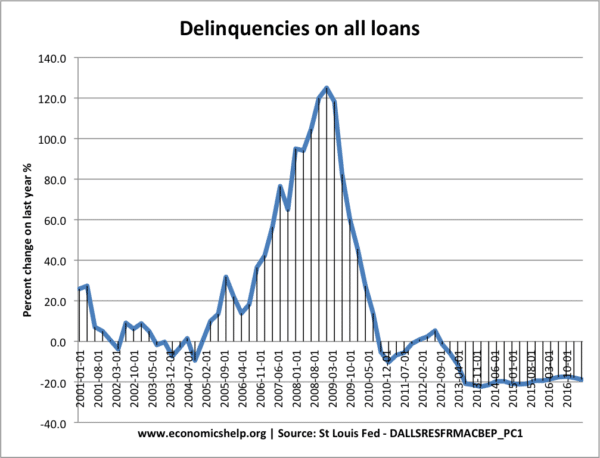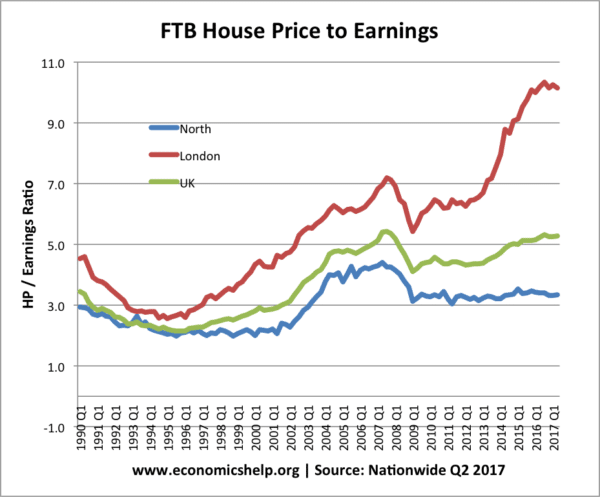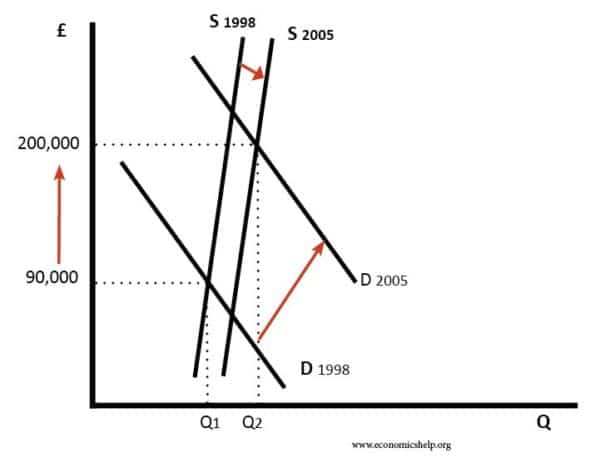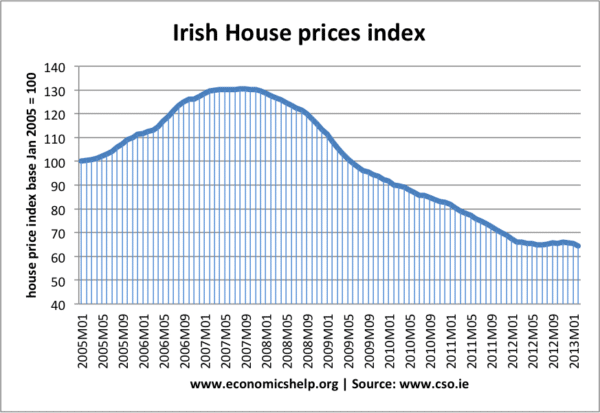Market failure occurs when the free market leads to an inefficient allocation of resources. See – types of market failure
Potential market failure in housing includes
- Homelessness – but empty housing
- Expensive cost of housing and inequality.
- Geographical immobility (regional difference in house prices)
- Boom and bust in house prices and effect on macroeconomy
- Housing as merit good – social problems (crime and vandalism) arising from lack of sufficiently good quality housing.
- Environmental costs of building new houses.
Homelessness
Homelessness can occur for various reasons – lack of income, lack of affordable housing, personal problems (drug addiction). At the same time as people are homeless, there are houses which are left empty and vacant as landlord sits on the property – rather than sub-let. This shows that free-market does not always achieve the optimal allocation of resources.
High cost of housing/inequality
House prices have risen faster than inflation causing many people (especially the young) to struggle in order to pay for housing. The problem is more acute in particular regions (south and London)
- In particular we have a situation where many young people are struggling to be able to afford to buy housing creating inequality. The ratio of house prices to income, is very high, meaning many young people are unable to buy.
This shows that for first time buyers – house prices have risen faster than earnings. It means many young people are unable to buy, but have to pay increasing costs of rents. There is an increasing generation divide with young people less likely to be able to buy – it could have long-term implications for pensions as people who don’t buy will have to keep paying expensive rents in retirement.
In other markets, the rising prices would cause an increase in supply. This would limit price increases and keep housing affordable. However, in many regions and cities, there are difficulties in increasing the supply of housing – due to limited land and planning restrictions (type of government failure)
Geographical immobilities
- Due to the divergence between house prices in the north and south, it can be difficult for workers to find suitable accommodation in London. Therefore, this leads to a shortage of key skilled workers in areas of very expensive house prices. For example, London schools and hospitals are experiencing staff shortages – partly caused by the housing market.
- It is difficult for firms to relocate and it is difficult to build houses in the expensive cities.
Merit Good/positive externalities
- Housing could also be seen as a type of merit good with positive externalities for the rest of society. If housing is of a poor standard (e.g. overcrowding, unsanitary conditions) it can contribute to social problems such as rioting, crime, unemployment and vandalism. Well maintained housing provides conditions more amenable to reducing these social problems.
- See: positive externalities in the housing market
Price instability
The housing market has seen volatile prices. In boom years, there has been an increase in mortgage lending and increased confidence. However, this period of rising prices is not permanent and has been followed by a crash in house prices – which can cause negative equity and a rise in home repossessions. In 2009/11, UK house prices fell 20% – there were bigger falls in the Irish, Spanish and US housing market.
US mortgage market

The problem is that falling house prices are very damaging to those who recently bought (leaves them with negative equity). Falling house prices can also precipitate an economic recession. When house prices fall – there is a negative wealth effect leading to lower spending. Also, banks become more cautious about lending. Falling house prices in 1990-92 and 2008-10 were both factors in causing recessions in the UK. W
Environmental factors.
- Another issue in the housing market is that building new houses on green belt land can lead to a loss of precious green spaces. There are negative externalities to building houses. However, this market failure conflicts with the other type of market failure – a lack of new houses built leading to higher prices.
Government policies to deal with market failure
- Maximum prices – on rents
- Mansion tax – progressive tax on wealth
- Policies to ease pressure on housing markets
Related




in Zambia the housing problem remains serious despite huge hectares of land which could be used to solve the problem. The other serious problem is corruption in the allocation of residential plots by the local councils especially the urban local councils. Only if the central government can invest heavily in the housing sector and I could be comfortable if the government and the private sector can work together the problem can be brought to rest. Basically that’s the situation in Zambia
In the U.S., some areas suffer from these (and other) issues while others do not. High house prices in the most desirable markets or those which have the strongest incomes or labor markets are simple outcomes of continued demand being met with limited supply, and the supply problem in many of these areas is not something that is quickly or easily solved.
It may be that these concentrations of jobs and workers that have fueled imbalances in markets such as San Francisco, Denver, Los Angeles and other areas need to be addressed by the employers that are driving these housing markets. Relocation of some or all operations to less-costly markets may ultimately need to be the response here, de-concentrating employment opportunities from oversaturated areas into those that are more affordable or have better space to accommodate an influx of people. Amazon’s search for a second headquarters, which purports to be carrying along with it some 50,000 jobs will be a very interesting experiment.
Imbalanced markets tend to correct themselves over time, and likely will again, but hopefully not quickly or all at once. The U.S. has seen depressed regional housing markets from time to time and these present any number of different challenges to these communities when they occur. That said, there are signs that things continue to evolve, and even areas that formerly had lots of jobs and population such as Detroit, MI and Pittsburgh, PA have had considerable renaissances in recent years.